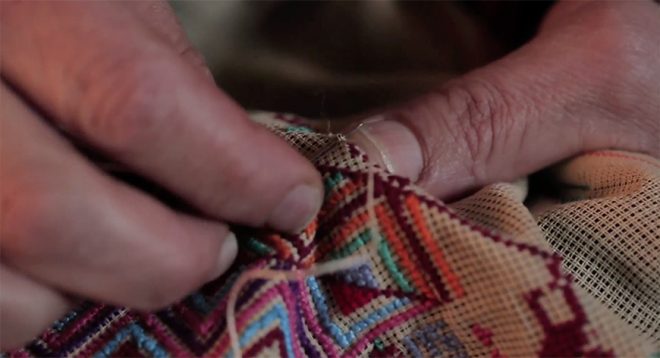

Follow us on:  
|

By Nadine Fahmy
Special to The BRICS Post

The Netherlands-Flemmish Institute in Cairo screened the documentary film Stitching Palestine (2017) in late February to a diverse audience brought together in a single, cold and narrow room to watch 12 Palestinian women tell stories of their lives in and out of exile.
The film showed interviews with Palestinian women in their homes.
Almost every interview began with a comment on embroidery and the thobe – a traditional Palestinian form of cross-stitch – and thus was formed the thread that connected all the women’s lives together: the thread of memory and Palestinian life, represented by the thobe.
“I love the blue on the thobe. Blue is my favorite color; it reminds me of the sea in Jaffa,” one woman said.
Every thread on the thobe and every pattern and color becomes a starting point that launches the women into a part of Palestine that they love: the food, the places, the houses and their orchards.
For Nazmiyyeh Salem, though, embroidery was a way of life — not just in the working hours of the day, but also, as she says, in the late hours of the night, after she puts her children to sleep.
“A word here, a stitch there, and life goes on,” she says.
Each of these women find a way to keep Palestine in their lives, even if they do not live there anymore, even if they are constantly reminded of its occupation by flags of Israel hung in the streets of their homes in Jerusalem.
They do so not only through the cultural relics of Palestine, but also through the things they have learned from the time of their lives there: even through the language and dialect they speak, which none of them has tried to unlearn or keep in the past.
Amal Ziad Kaawash, in one of the most moving scenes of the film, sings a song she has written but not released.
She sings in Arabic: “Always hidden in my wardrobe, my thobe. And it will return home one day.”
The film also showed snippets of a comic strip created by Kaawash, following a young girl with two long braids whose name is Meiroun, after the name of Kaawash’s village in northern Palestine.
Kaawash explains that she has achieved a virtual liberation of Meiroun, the village that was not known by many and whose name she had wanted to see and hear more often than before.
She explains that Meiroun, the girl, lives in diaspora. She is only followed by the moon everywhere she goes, but she has no physical home.
There is no permanent setting where Meiroun returns in the comic strip; each comic is in a new (always seemingly abandoned and empty) space; a stark, artistic metaphor of the real lives of Palestinians in diaspora.
Their lives and the memories of their country are often one and the same for these women: one life replenishes the other, one memory immortalizes the other.
Other than Salem and Kaawash, the women in the film were academics, activists, lawyers and actors, but all with one thing in common: a memory of Palestine. And a memory of the life that came after.
Huda al-Imam was banished from her home, rejected by its current Israeli residents. Dina Nasser was banished from existence, told on the phone by an Israeli official whom she had been requesting official papers from, “sorry, you do not exist.”
Each of the women has a story of pain and suffering, and yet each, a story of survival.
The film’s director Carol Mansour received a standing ovation after the end credits.
After a few questions and comments on the film, one woman wearing a kefiyah around her neck was handed the microphone, shot up from her chair, and before embarking on a passionate speech, Mansour inched closer, taking a picture of her.
The woman then started: “I visited Palestine with you, and I have never visited it in my life, because I’m from Gaza and I’m not allowed to visit the West Bank. You told a history … A history of days that exist in the Arab mind, but what kills me is when you talk to the cultured and the educated people of the Arab world and they say: ‘Ah, you are the Palestinians. You sold your land’.”
“How did we sell our land? If we had sold our land, you would have seen us in Washington or the Caribbean Islands, not in camps.”
“What I always think of is how the Jews were exiled around the world and were able to come together and take from us our country, I know that someday, every one of us in exile all around the world will gather and return to our country insha’allah [God willing].”
Her speech was followed by a chorus of quiet, timid insha’allah from the audience.